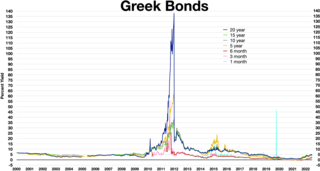Related Research Articles

S&P Global Ratings is an American credit rating agency (CRA) and a division of S&P Global that publishes financial research and analysis on stocks, bonds, and commodities. S&P is considered the largest of the Big Three credit-rating agencies, which also include Moody's Investors Service and Fitch Ratings. Its head office is located on 55 Water Street in Lower Manhattan, New York City.

A credit rating agency is a company that assigns credit ratings, which rate a debtor's ability to pay back debt by making timely principal and interest payments and the likelihood of default. An agency may rate the creditworthiness of issuers of debt obligations, of debt instruments, and in some cases, of the servicers of the underlying debt, but not of individual consumers.
A credit rating is an evaluation of the credit risk of a prospective debtor, predicting their ability to pay back the debt, and an implicit forecast of the likelihood of the debtor defaulting. The credit rating represents an evaluation from a credit rating agency of the qualitative and quantitative information for the prospective debtor, including information provided by the prospective debtor and other non-public information obtained by the credit rating agency's analysts.
Moody's Ratings, previously known as Moody's Investors Service, often referred to as Moody's, is the bond credit rating business of Moody's Corporation, representing the company's traditional line of business and its historical name. Moody's Ratings provides international financial research on bonds issued by commercial and government entities. Moody's, along with Standard & Poor's and Fitch Group, is considered one of the Big Three credit rating agencies. It is also included in the Fortune 500 list of 2021.
In investment, the bond credit rating represents the credit worthiness of corporate or government bonds. It is not the same as an individual's credit score. The ratings are published by credit rating agencies and used by investment professionals to assess the likelihood the debt will be repaid.
Credit rating agencies (CRAs)—firms which rate debt instruments/securities according to the debtor's ability to pay lenders back—played a significant role at various stages in the American subprime mortgage crisis of 2007–2008 that led to the great recession of 2008–2009. The new, complex securities of "structured finance" used to finance subprime mortgages could not have been sold without ratings by the "Big Three" rating agencies—Moody's Investors Service, Standard & Poor's, and Fitch Ratings. A large section of the debt securities market—many money markets and pension funds—were restricted in their bylaws to holding only the safest securities—i.e. securities the rating agencies designated "triple-A". The pools of debt the agencies gave their highest ratings to included over three trillion dollars of loans to homebuyers with bad credit and undocumented incomes through 2007. Hundreds of billions of dollars' worth of these triple-A securities were downgraded to "junk" status by 2010, and the writedowns and losses came to over half a trillion dollars. This led "to the collapse or disappearance" in 2008–09 of three major investment banks, and the federal government's buying of $700 billion of bad debt from distressed financial institutions.
Deven Sharma is an Indian businessman.

From late 2009, fears of a sovereign debt crisis in some European states developed, with the situation becoming particularly tense in early 2010. Greece was most acutely affected, but fellow Eurozone members Cyprus, Ireland, Italy, Portugal, and Spain were also significantly affected. In the EU, especially in countries where sovereign debt has increased sharply due to bank bailouts, a crisis of confidence has emerged with the widening of bond yield spreads and risk insurance on credit default swaps between these countries and other EU members, most importantly Germany.
The Big Three credit rating agencies are S&P Global Ratings (S&P), Moody's, and Fitch Group. S&P and Moody's are based in the US, while Fitch is dual-headquartered in New York City and London, and is controlled by Hearst. As of 2013 they hold a collective global market share of "roughly 95 percent" with Moody's and Standard & Poor's having approximately 40% each, and Fitch around 15%.
In 2011, ongoing political debate in the United States Congress about the appropriate level of government spending and its effect on the national debt and deficit reached a crisis centered on raising the debt ceiling, leading to the passage of the Budget Control Act of 2011.

The Budget Control Act of 2011 is a federal statute enacted by the 112th United States Congress and signed into law by US President Barack Obama on August 2, 2011. The Act brought conclusion to the 2011 US debt-ceiling crisis.
David T. Beers is a financial analyst and until December 2011 was head of sovereign credit ratings for credit rating agency Standard & Poor's (S&P). In August 2011, Beers earned significant attention as the S&P executive responsible for downgrading the credit rating of United States Treasury bonds to AA+. Prior to this, the United States had maintained a AAA credit rating since 1941. He lives in London. In January 2012, Beers announced his appointment, effective February 1, as Special Adviser to the Governor of the Bank of Canada.
The August 2011 stock markets fall was the sharp drop in stock prices in August 2011 in stock exchanges across the United States, Middle East, Europe and Asia. This was due to fears of contagion of the European sovereign debt crisis to Spain and Italy, as well as concerns over France's current AAA rating, concerns over the slow economic growth of the United States and its credit rating being downgraded. Severe volatility of stock market indexes continued for the rest of the year.
Several credit rating agencies around the world have downgraded their credit ratings of the U.S. federal government, including Standard & Poor's (S&P) which reduced the country's rating from AAA (outstanding) to AA+ (excellent) on August 5, 2011.
In finance and investing, Black Monday 2011 refers to August 8, 2011, when US and global stock markets crashed following the Friday night credit rating downgrade by Standard and Poor's of the United States sovereign debt from AAA, or "risk free", to AA+. It was the first time in history the United States was downgraded. Moody's issued a report during morning trading which said their AAA rating of U.S. credit was in jeopardy, this after issuing a negative outlook in the previous week.

The eurozone crisis is an ongoing financial crisis that has made it difficult or impossible for some countries in the euro area to repay or re-finance their government debt without the assistance of third parties.

The Greek government-debt crisis began in 2009 and, as of November 2017, was still ongoing. During this period, many changes had occurred in Greece. The income of many Greeks has declined, levels of unemployment have increased, elections and resignations of politicians have altered the country's political landscape radically, the Greek parliament has passed many austerity bills, and protests have become common sights throughout the country.

The Venezuelan economic crisis is the deterioration that began to be noticed in the main macroeconomic indicators from the year 2012, and whose consequences continue, not only economically but also politically and socially. The April 2019 International Monetary Fund (IMF) World Economic Outlook described Venezuela as being in a "wartime economy". For the fifth consecutive year, Bloomberg rated Venezuela first on its misery index in 2019.
Sri Lanka declared the country was suspending payment on most foreign debt from April 12, 2022, kindling the Indian Ocean island's first sovereign default event and ending an unblemished record of repaying external debt despite experiencing milder currency crises in the past. By April Sri Lanka was suffering the worst monetary crisis in its history with a steeply falling rupee, high inflation and forex shortages which triggered shortfalls of fuel, power and medicine. Widespread public protests led to a political crisis. In March, the International Monetary Fund released a report saying publicly for the first time that the country's debt was unsustainable and required re-structuring. Authorities had advertised for financial and legal advisors to help negotiate with creditors shortly before the suspension was announced.
References
- 1 2 Buiso, Gary; Burke, Cathy; Roberts, Georgett (7 August 2011). "Downgrade 'doer' was no biz wiz". New York Post. Retrieved 2013-02-17.
Yet John Chambers, 55,...has became[ sic?] the stern public face of Standard & Poor's, the private agency that wreaked havoc Friday night by notching down the nation's credit to double-A from triple-A.
- 1 2 Dallas, George S. (2004). Governance and risk: an analytical handbook for investors, managers, directors, and stakeholders. McGraw-Hill. pp. xviii–xix. ISBN 9780071429542.
- ↑ "S&P's Chambers Says U.S. Debt Problems Need Bipartisan Solution". San Francisco Chronicle. 7 August 2011. Retrieved 8 August 2011.[ dead link ]
- ↑ Schwartz, Nelson D.; Eric Dash (7 August 2011). "S&P takes heat, defends its U.S. downgrade". Sacramento Bee. Retrieved 8 August 2011.[ permanent dead link ]
- ↑ Making the Call on U.S. Credit Rating. Wall Street Journal, July 22, 2011
- ↑ "Iowa Band - Development | Grinnell College". Archived from the original on 2012-03-17. Retrieved 2011-08-08.
- 1 2 "Arab Bankers Association of North America - John B. Chambers, CFA". Archived from the original on 2011-10-08. Retrieved 2011-09-14.